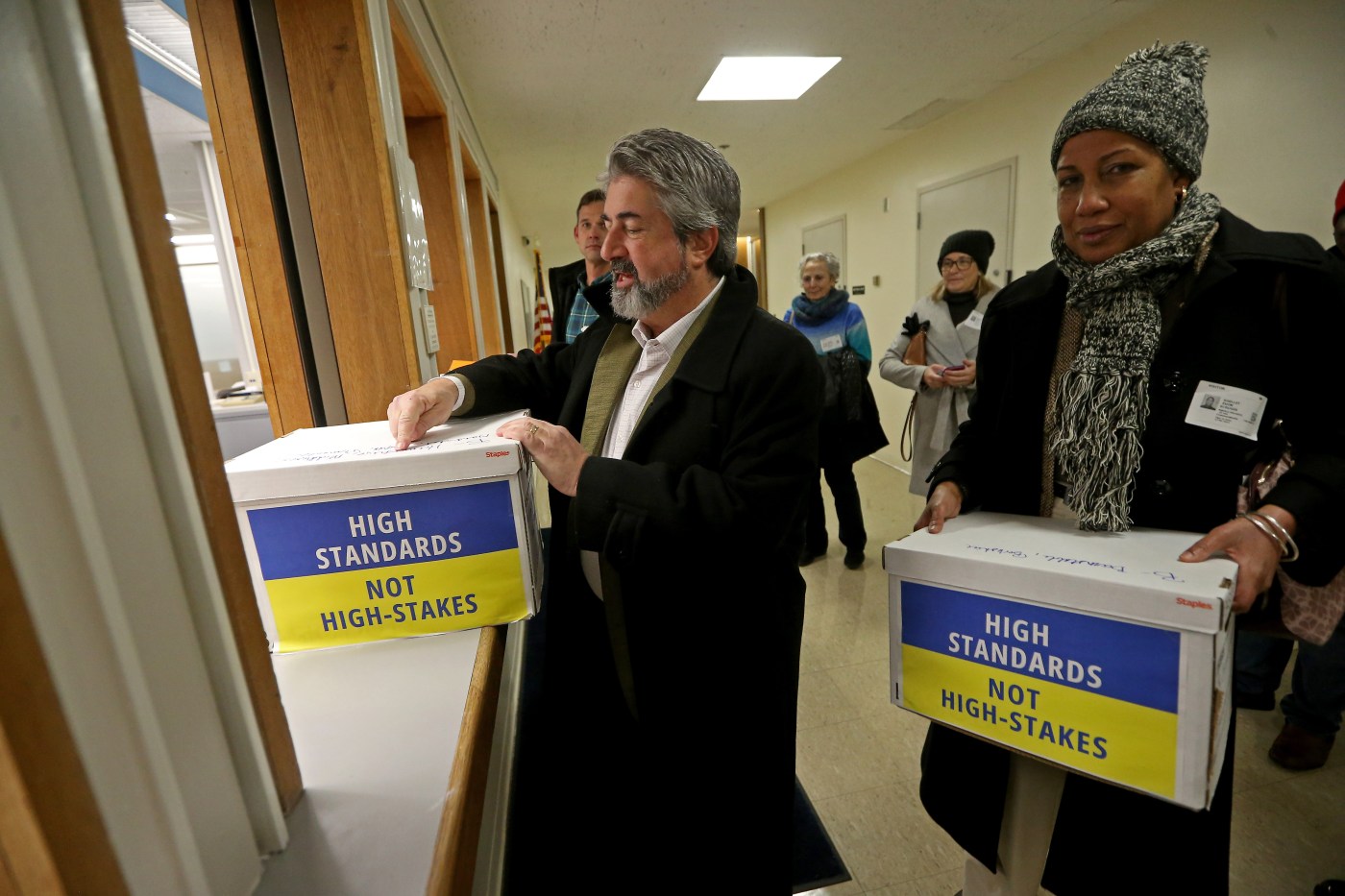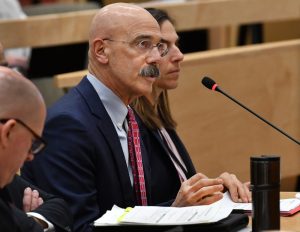
Nixing MCAS requirement, psychedelic decriminalization advance toward 2024 ballot
Advocates looking to advance their ballot questions to the 2024 state elections cleared another hurdle Wednesday when they submitted thousands of signatures to the secretary of state’s office.
Campaigns focused on ending the use of the MCAS as a high school graduation requirement, auditing the Legislature, decriminalizing psychedelics for mental health treatments, opening a pathway for rideshare drivers to unionize, and classifying rideshare drivers as independent contractors all said they had enough signatures to keep moving forward.
Members of the Massachusetts Teachers Association rallied outside the State House before heading over to the Secretary of State’s office to finish off filing the more than 135,000 signatures they gathered.
The question would end the use of the test as a graduation requirement, not nix the test altogether. The union announced they had cleared the 75,000 signature requirement in early November, among the first initiatives to do so.
“We have very high standards,” said MTA President Max Page. “We have some of the best educators in the country. We don’t need this high stakes test. We need more time for real learning.”
Massachusetts is one of nine remaining states using standardized testing as a graduation requirement. Of the remaining nine, Florida, New Jersey and New York have also introduced recent measures to do away with the practice.
Democrats for Education Reform Massachusetts Director Mary Tamer, a leading opponent of the ballot question, said she had concerns about the effect eliminating the MCAS requirement would have on student achievement and equity.
“Abandoning the MCAS graduation requirement would eliminate a single statewide standard based on consistent, objective measurements across school districts, significantly reducing the value of a high school diploma,” Tamer wrote.
Attorney General Andrea Campbell certified 34 ballot questions and proposed constitutional amendments, only some of which cleared the first signature gathering deadline last month. Secretary of State William Galvin said Wednesday he only expected 11 to file signatures by the 5 p.m. deadline.
“While the review process typically takes three weeks to complete, Galvin expects this year’s review will be longer, due to the unusually high number of petitions being filed,” a spokesperson said in a statement.
Petitions that clear Galvin’s review are sent to the Legislature for consideration. If lawmakers do not pass them by May, supporters will need to gather a final round of signatures to get onto the 2024 ballot.
A group advancing a ballot question that would decriminalize psychedelics for mental health treatment dropped off boxes of signatures at the secretary of state’s office Wednesday. (Stuart Cahill/Boston Herald)
Massachusetts for Mental Health Options, the group behind the psychedelics question, said they turned in more than 95,000 signatures to Galvin’s office. Supporters showed up with a mountain of boxes representing signatories from across the state.
Winthrop Police Lt. Sarko Gergerian said Massachusetts is in a mental health crisis “of epidemic proportions.”
“This has decriminalization for the five traditional psychedelics at home. But it also sets up the healing centers for people to go and work with trained facilitators. And there’s going to be levels of training for those facilitators,” Gergerian said. “Some people will need a more intensive type of care and some people need a lot less care.”
The question would allow adults 21 and older to seek out regulated psychedelics in licensed therapeutic centers for mental health treatment, according to a summary prepared by Campbell’s office. It would also allow individuals to grow mushrooms at home.
United States Navy veteran Emily Oneschuk said psychedelics offer people “10 years of therapy in like six hours.”
“I’m not saying that’s true for everyone, but you get to work through really complex issues in a very condensed period of time in a way that at least I have not encountered in talk therapy, or cognitive behavioral therapy,” Oneschuk told the Herald. “It just gives you a new perspective that I think is very hard to find otherwise.”
Another campaign that wants to see tipped workers receive the full $15 minimum wage on top of tips said they collected and submitted more than 85,000 signatures.
“This certification marks a decisive moment in our campaign, clearly showing that Massachusetts voters are ready to move away from outdated wage practices and towards a system that guarantees dignity, justice, and economic security for all workers,” One Fair Wage President Saru Jayaraman said in a statement.
Joanne Miksis, who is listed as the representative for different versions of a ballot question that would generally require voters to show identification at the polls, was also at the secretary of state’s office Wednesday with two suitcases full of signature papers.
Miksis declined to explain the question and did not say who was funding the campaign.
“Yeah, but you know what, I have an appointment we got to run to,” Miksis said when asked to confirm her identity. “No, not at this time, we’ve got to go,” Miksis said when asked to explain the question.


